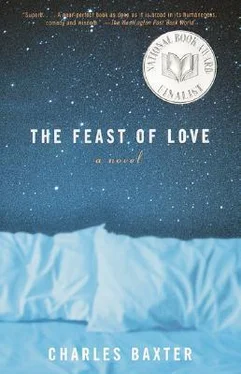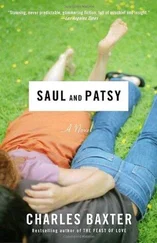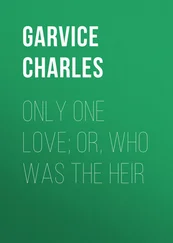Back in Ann Arbor, Bradley greeted me with great joy, which for once was not contagious. I walked into the kitchen and turned on the overhead fluorescent light. It snaps at you when you do that, before it begins to shower glare and that flickering corpse-blue illumination on the sink and the Formica counter and the red dish drainer. For once I believed Harry and Esther; there was indeed a dybbuk living in the house with me. I saw it in the living room. It had the appearance of an easy chair. Demons can disguise themselves cleverly.
I sat down. My head was full of wild ambitious urges to hurt myself. I tasted the ambrosia of maddened impulse. I wanted my interior pain out in my body somehow. I wanted this vague pain to be specific. That’s how I explain it.
I took out my sharpest knife and cut off the very tip of my little finger. On my left hand.
I sat there and bled while my dog whined and barked at me. Then I called my neighbor, Harry Ginsberg, and he drove me in my car down to the hospital. He did not comment or ask questions. He’s a good man. Philosophy has taught him how to keep his mouth shut when necessary. I insisted on taking my car because I knew I would leave bloodstains soaked into the leatherette, and indeed I did: great expressive blotch-stains. At the emergency entrance, Harry dropped me off to park the car. Eventually they put me into a room with this black woman, this doctor, who introduced herself as Dr. Margaret Ntegyereize, and she was the one who bandaged me up. She asked me how I had done such a thing. I explained. She had beautiful eyes, Margaret did, and no wedding ring, and I fell in love with her on the spot. I couldn’t tactfully get her phone number right there but resolved to obtain it by stealth.
Driving me home, Harry told me — how could I not know it? — that Jackson Pollock had cut off the tip of his little finger at the age of seven. Seven! Jesus Christ. Not even my pain is original.
IN THOSE DAYS, before I fell in love with Diana and married her (which was after Bradley had met her, married her, and she left him for me) — before all that, I used to hunt in the forests and marshes up north. Deer, in particular, but ducks also, and pheasants. Now that I’ve lost that passion, I remember my prey with an odd clarity. I see all the individual animals I killed and cleaned and prepared for meals, crossing my line of sight one by one like mechanical birds in a shooting gallery flipping up from one side and sinking down on the other. I see their eyes, small glintings there. Sympathy for these animals? Why should I feel sympathy? That’s for others. They were one form of life, I was another. I was never one of them.
It could be that I didn’t think at all. The cells of my body collectively strained to be outside with a weapon in my hand, in pursuit of them.
Every part of this pursuit made me edgy and alert. I didn’t say to myself: I like to hunt. Liking had nothing to do with it. It was much more simple: I was a hunter, and that simplified my identity. I didn’t really have to consider the matter at all. I hunted the way an apple tree produces apples, as if it was purely second nature. My father had taught me how. I felt his presence there in those woods and fields, the weight of his flesh and bones on my shoulders, the sound of his gruff voice in my ear.
I counted the days until hunting season opened just as other men counted the days on the calendar until baseball or football season began. My hunting clothes were stored in a basement closet, the bright orange for deer hunting, the camouflage for the ducks. I’d go to that particular corner, open the door, yank at the pull chain for the light, and just look at the clothes, hanging there, swaying sometimes in the draft I had brought in, or from the furnace vents, swaying like ghosts dangling on the clothes rack. I’d have a beer in my hand and I would drink the beer as I gazed at the contents of the basement corner, an expression of suspended animation on my face.
I had a succession of girlfriends who tolerated this behavior. Then I had Katrinka. I married her.
I gave it all up when I left her and moved in with Diana, when I left my boys, Carl and Jeremiah, and took up with her. Once Diana belonged to me, and once I had begun to experience what it was like to live with her, and to live without my sons except on weekends, to have lost or at least be separated from my children, I abandoned all my interest in hunting. I took all my guns and my hunting clothes to the dump. I had no intention of selling them or giving them away. I didn’t want them to fall into another man’s hands. I wanted their history to end with me. I loved her, I loved her with some kind of violence, and that was all that mattered.
THERE’S ANOTHER STORY I want to tell you, and then I’ll be finished. I don’t think people should talk about their health, but this story is more about love than medicine. I had gone to the dentist for a routine cleaning. The dental hygienist, a pleasant woman about my age with whom I conversed easily, had just about finished the job when, as she was examining my throat, she said, “Hmm.” She asked me to open wider and to say, “Ah.” I did. She looked. I gazed out the window at the view. She did not say what she was looking at. I stayed calm. She called in the dentist, who also took a long look at me — at my tonsils, it turned out, and the uvula, on which were spots of some sort.
“There’s something there,” she said with maddening nonspecificity. “I don’t think it’s serious, but I’m sending you to a specialist. Just for a look.”
“What do you see?” I asked.
“Probably nothing,” she said. “Probably just a couple of papillomas. Which are like warts, a wart on your throat.” She looked at me carefully. “Really,” she said, “that’s all I think they are.”
She gave me the name of the specialist I was to see, a Dr. Hovhanessian. When I called his office, I discovered that I would have to wait for a month for an appointment. It was August, and Dr. Hov would be on vacation, his secretary told me, so I — and my throat and its contents — would have to bide the time until he returned.
On the day of the appointment, I drove over to the medical complex, checked in at his front desk, and sat in the waiting room reading old copies of Time and Newsweek. Eventually the nurse called my name and ushered me into an examination room that at its center featured a chair like a dentist’s chair. Up on the wall were various posters about deafness and throat cancer. I had thought about throat cancer and about the possible choking or pain that might accompany it, I thought of speaking with an artificial larynx, but the truth is that until that moment I had really done my best to be a man about it and to keep the whole matter out of my mind. I’m quite good at such denials and exclusions.
Bad health is for others. I’m not supposed to get sick.
But in that examination room with that black chair in front of me, my heart began to pound, and because the chair I was sitting in was a simple metal one with stainless steel sleighlike runners resting on the slippery blue-speckled linoleum tile, I found myself moving slowly across the floor, powered by the pounding of my heart against my back. Fear has a certain horsepower, I discovered.
Dr. Hovhanessian eventually arrived. He was an oval-faced man who affected an authoritative air and who presented a general and perhaps inflated aura of competence. We exchanged pleasantries and he was kind enough to show interest in the research work I do for the drug company (I’m a molecular biologist). Then he said, “Let’s have a look at you.”
When the exam was over, he leaned back and said, “You don’t have anything.”
Читать дальше
Конец ознакомительного отрывка
Купить книгу












